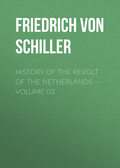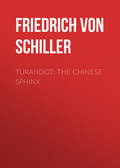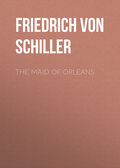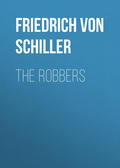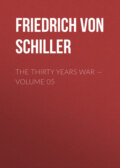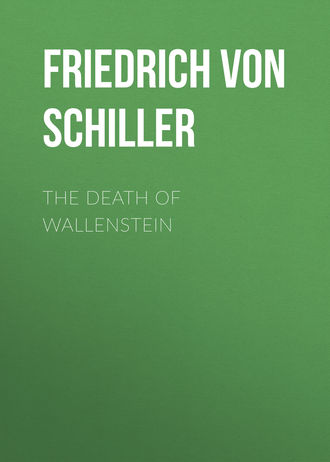
Фридрих Шиллер
The Death of Wallenstein
SCENE VIII
GORDON and BUTLER.
GORDON (looking after them)
Unhappy men! How free from all foreboding
They rush into the outspread net of murder
In the blind drunkenness of victory;
I have no pity for their fate. This Illo,
This overflowing and foolhardy villain,
That would fain bathe himself in his emperor's blood.
BUTLER
Do as he ordered you. Send round patrols,
Take measures for the citadel's security;
When they are within I close the castle-gate
That nothing may transpire.
GORDON (with earnest anxiety)
Oh! haste not so!
Nay, stop; first tell me —
BUTLER
You have heard already,
To-morrow to the Swedes belongs. This night
Alone is ours. They make good expedition.
But we will make still greater. Fare you well.
GORDON
Ah! your looks tell me nothing good. Nay, Butler,
I pray you promise me!
BUTLER
The sun has set;
A fateful evening doth descend upon us,
And brings on their long night! Their evil stars
Deliver them unarmed into our hands,
And from their drunken dream of golden fortunes
The dagger at their hearts shall rouse them. Well,
The duke was ever a great calculator;
His fellow-men were figures on his chess-board
To move and station, as his game required.
Other men's honor, dignity, good name,
Did he shift like pawns, and made no conscience of
Still calculating, calculating still;
And yet at last his calculation proves
Erroneous; the whole game is lost; and low!
His own life will be found among the forfeits.
GORDON
Oh, think not of his errors now! remember
His greatness, his munificence; think on all
The lovely features of his character,
On all the noble exploits of his life,
And let them, like an angel's arm, unseen,
Arrest the lifted sword.
BUTLER
It is too late.
I suffer not myself to feel compassion,
Dark thoughts and bloody are my duty now.
[Grasping GORDON's hand.
Gordon! 'tis not my hatred (I pretend not
To love the duke, and have no cause to love him).
Yet 'tis not now my hatred that impels me
To be his murderer. 'Tis his evil fate.
Hostile occurrences of many events
Control and subjugate me to the office.
In vain the human being meditates
Free action. He is but the wire-worked8 puppet
Of the blind Power, which, out of its own choice,
Creates for him a dread necessity.
What too would it avail him if there were
A something pleading for him in my heart —
Still I must kill him.
GORDON
If your heart speak to you
Follow its impulse. 'Tis the voice of God.
Think you your fortunes will grow prosperous
Bedewed with blood – his blood? Believe it not!
BUTLER
You know not. Ask not! Wherefore should it happen
That the Swedes gained the victory, and hasten
With such forced marches hitherwards? Fain would I
Have given him to the emperor's mercy. Gordon!
I do not wish his blood, – but I must ransom
The honor of my word, – it lies in pledge —
And he must die, or —
[Passionately grasping GORDON's hand.
Listen, then, and know
I am dishonored if the duke escape us.
GORDON
Oh! to save such a man —
BUTLER
What!
GORDON
It is worth
A sacrifice. Come, friend! Be noble-minded!
Our own heart, and not other men's opinions,
Forms our true honor.
BUTLER (with a cold and haughty air)
He is a great lord,
This duke, and I am of but mean importance.
This is what you would say! Wherein concerns it
The world at large, you mean to hint to me,
Whether the man of low extraction keeps
Or blemishes his honor —
So that the man of princely rank be saved?
We all do stamp our value on ourselves:
The price we challenge for ourselves is given us.
There does not live on earth the man so stationed
That I despise myself compared with him.
Man is made great or little by his own will;
Because I am true to mine therefore he dies!
GORDON
I am endeavoring to move a rock.
Thou hadst a mother, yet no human feelings.
I cannot hinder you, but may some God
Rescue him from you!
[Exit GORDON.
BUTLER9 (alone)
I treasured my good name all my life long;
The duke has cheated me of life's best jewel,
So that I blush before this poor weak Gordon!
He prizes above all his fealty;
His conscious soul accuses him of nothing;
In opposition to his own soft heart
He subjugates himself to an iron duty.
Me in a weaker moment passion warped;
I stand beside him, and must feel myself
The worst man of the two. What though the world
Is ignorant of my purposed treason, yet
One man does know it, and can prove it, too —
High-minded Piccolomini!
There lives the man who can dishonor me!
This ignominy blood alone can cleanse!
Duke Friedland, thou or I. Into my own hands
Fortune delivers me. The dearest thing a man has is himself.
SCENE IX
[A gothic and gloomy apartment at the DUCHESS FRIEDLAND's.
THEKLA on a seat, pale, her eyes closed. The DUCHESS and LADY NEUBRUNN busied about her. WALLENSTEIN and the COUNTESS in conversation.
WALLENSTEIN
How knew she it so soon?
COUNTESS
She seems to have
Foreboded some misfortune. The report
Of an engagement, in which had fallen
A colonel of the imperial army, frightened her.
I saw it instantly. She flew to meet
The Swedish courier, and with sudden questioning,
Soon wrested from him the disastrous secret.
Too late we missed her, hastened after her,
We found her lying in his arms, all pale,
And in a swoon.
WALLENSTEIN
A heavy, heavy blow!
And she so unprepared! Poor child! how is it?
[Turning to the DUCHESS.
Is she coming to herself?
DUCHESS
Her eyes are opening —
COUNTESS
She lives!
THEKLA (looking around her)
Where am I?
WALLENSTEIN (steps to her, raising her up in his arms)
Come, cheerly, Thekla! be my own brave girl!
See, there's thy loving mother. Thou art in
Thy father's arms.
THEKLA (standing up)
Where is he? Is he gone?
DUCHESS
Who gone, my daughter?
THEKLA
He – the man who uttered
That word of misery.
DUCHESS
Oh, think not of it!
My Thekla!
WALLENSTEIN
Give her sorrow leave to talk!
Let her complain – mingle your tears with hers,
For she hath suffered a deep anguish; but
She'll rise superior to it, for my Thekla
Hath all her father's unsubdued heart.
THEKLA
I am not ill. See, I have power to stand.
Why does my mother weep? Have I alarmed her?
It is gone by – I recollect myself.
[She casts her eyes round the room, as seeking some one.
Where is he? Please you, do not hide him from me.
You see I have strength enough: now I will hear him.
DUCHESS
No; never shall this messenger of evil
Enter again into thy presence, Thekla!
THEKLA
My father —
WALLENSTEIN
Dearest daughter!
THEKLA
I'm not weak.
Shortly I shall be quite myself again.
You'll grant me one request?
WALLENSTEIN
Name it, my daughter.
THEKLA
Permit the stranger to be called to me,
And grant me leave, that by myself I may
Hear his report and question him.
DUCHESS
No, never!
COUNTESS
'Tis not advisable – assent not to it.
WALLENSTEIN
Hush! Wherefore wouldst thou speak with him, my daughter?
THEKLA
Knowing the whole, I shall be more collected;
I will not be deceived. My mother wishes
Only to spare me. I will not be spared —
The worst is said already: I can hear
Nothing of deeper anguish!
COUNTESS and DUCHESS
Do it not.
THEKLA
The horror overpowered me by surprise,
My heart betrayed me in the stranger's presence:
He was a witness of my weakness, yea,
I sank into his arms; and that has shamed me.
I must replace myself in his esteem,
And I must speak with him, perforce, that he,
The stranger, may not think ungently of me.
WALLENSTEIN
I see she is in the right, and am inclined
To grant her this request of hers. Go, call him.
[LADY NEUBRUNN goes to call him.
DUCHESS
But I, thy mother, will be present —
THEKLA
'Twere
More pleasing to me if alone I saw him;
Trust me, I shall behave myself the more
Collectedly.
WALLENSTEIN
Permit her her own will.
Leave her alone with him: for there are sorrows,
Where of necessity the soul must be
Its own support. A strong heart will rely
On its own strength alone. In her own bosom,
Not in her mother's arms, must she collect
The strength to rise superior to this blow.
It is mine own brave girl. I'll have her treated
Not as the woman, but the heroine.
[Going.
COUNTESS (detaining him)
Where art thou going? I heard Terzky say
That 'tis thy purpose to depart from hence
To-morrow early, but to leave us here.
WALLENSTEIN
Yes, ye stay here, placed under the protection
Of gallant men.
COUNTESS
Oh, take us with you, brother.
Leave us not in this gloomy solitude.
To brood o'er anxious thoughts. The mists of doubt
Magnify evils to a shape of horror.
WALLENSTEIN
Who speaks of evil? I entreat you, sister,
Use words of better omen.
COUNTESS
Then take us with you.
Oh leave us not behind you in a place
That forces us to such sad omens. Heavy
And sick within me is my heart —
These walls breathe on me like a churchyard vault.
I cannot tell you, brother, how this place
Doth go against my nature. Take us with you.
Come, sister, join you your entreaty! Niece,
Yours too. We all entreat you, take us with you!
WALLENSTEIN
The place's evil omens will I change,
Making it that which shields and shelters for me
My best beloved.
LADY NEUBRUNN (returning)
The Swedish officer.
WALLENSTEIN
Leave her alone with me.
DUCHESS (to THEKLA, who starts and shivers)
There – pale as death! Child, 'tis impossible
That thou shouldst speak with him. Follow thy mother.
THEKLA
The Lady Neubrunn then may stay with me.
[Exeunt DUCHESS and COUNTESS.
SCENE X
THEKLA, THE SWEDISH CAPTAIN, LADY NEUBRUNN.
CAPTAIN (respectfully approaching her)
Princess – I must entreat your gentle pardon —
My inconsiderate rash speech. How could! —
THEKLA (with dignity)
You have beheld me in my agony.
A most distressful accident occasioned
You from a stranger to become at once
My confidant.
CAPTAIN
I fear you hate my presence,
For my tongue spake a melancholy word.
THEKLA
The fault is mine. Myself did wrest it from you.
The horror which came o'er me interrupted
Your tale at its commencement. May it please you,
Continue it to the end.
CAPTAIN
Princess, 'twill
Renew your anguish.
THEKLA
I am firm, —
I will be firm. Well – how began the engagement?
CAPTAIN
We lay, expecting no attack, at Neustadt,
Intrenched but insecurely in our camp,
When towards evening rose a cloud of dust
From the wood thitherward; our vanguard fled
Into the camp, and sounded the alarm.
Scarce had we mounted ere the Pappenheimers,
Their horses at full speed, broke through the lines,
And leaped the trenches; but their heedless courage
Had borne them onward far before the others —
The infantry were still at distance, only
The Pappenheimers followed daringly
Their daring leader —
[THEKLA betrays agitation in her gestures. The officer pauses till she makes a sign to him to proceed.
CAPTAIN
Both in van and flanks
With our whole cavalry we now received them;
Back to the trenches drove them, where the foot
Stretched out a solid ridge of pikes to meet them.
They neither could advance, nor yet retreat;
And as they stood on every side wedged in,
The Rhinegrave to their leader called aloud,
Inviting a surrender; but their leader,
Young Piccolomini —
[THEKLA, as giddy, grasps a chair.
Known by his plume,
And his long hair, gave signal for the trenches;
Himself leaped first: the regiment all plunged after.
His charger, by a halbert gored, reared up,
Flung him with violence off, and over him
The horses, now no longer to be curbed, —
[THEKLA, who has accompanied the last speech with all the marks of increasing agony, trembles through her whole frame and is falling. The LADY NEUBRUNN runs to her, and receives her in her arms.
NEUBRUNN
My dearest lady!
CAPTAIN
I retire.
THERLA
'Tis over.
Proceed to the conclusion.
CAPTAIN
Wild despair
Inspired the troops with frenzy when they saw
Their leader perish; every thought of rescue
Was spurned; they fought like wounded tigers; their
Frantic resistance roused our soldiery;
A murderous fight took place, nor was the contest
Finished before their last man fell.
THEKLA (faltering).
And where —
Where is – you have not told me all.
CAPTAIN (after a pause)
This morning
We buried him. Twelve youths of noblest birth
Did bear him to interment; the whole army
Followed the bier. A laurel decked his coffin;
The sword of the deceased was placed upon it,
In mark of honor by the Rhinegrave's self,
Nor tears were wanting; for there are among us
Many, who had themselves experienced
The greatness of his mind and gentle manners;
All were affected at his fate. The Rhinegrave
Would willingly have saved him; but himself
Made vain the attempt – 'tis said he wished to die.
NEUBRUNN (to THEKLA, who has hidden her countenance)
Look up, my dearest lady —
THEKLA
Where is his grave?
CAPTAIN
At Neustadt, lady; in a cloister church
Are his remains deposited, until
We can receive directions from his father.
THEKLA
What is the cloister's name?
CAPTAIN
Saint Catherine's.
THEKLA
And how far is it thither?
CAPTAIN
Near twelve leagues.
THEKLA
And which the way?
CAPTAIN
You go by Tirschenreut
And Falkenberg, through our advanced posts.
THEKLA
Who
Is their commander?
CAPTAIN
Colonel Seckendorf.
[THEKLA steps to the table, and takes a ring from a casket.
THEKLA
You have beheld me in my agony,
And shown a feeling heart. Please you, accept
[Giving him the ring.
A small memorial of this hour. Now go!
CAPTAIN (confusedly)
Princess —
[THEKLA silently makes signs to him to go, and turns from him.
The captain lingers, and is about to speak. LADY NEUBRUNN repeats
the signal, and he retires.
SCENE XI
THEKLA, LADY NEUBRUNN.
THEKLA (falls on LADY NEUBRUNN's neck)
Now gentle Neubrunn, show me the affection
Which thou hast ever promised – prove thyself
My own true friend and faithful fellow-pilgrim.
This night we must away!
NEUBRUNN
Away! and whither?
THEKLA
Whither! There is but one place in the world.
Thither, where he lies buried! To his coffin!
NEUBRUNN
What would you do there?
THEKLA
What do there?
That wouldst thou not have asked, hadst thou e'er loved.
There, that is all that still remains of him!
That single spot is the whole earth to me.
NEUBRUNN
That place of death —
THEKLA
Is now the only place
Where life yet dwells for me: detain me not!
Come and make preparations; let us think
Of means to fly from hence.
NEUBRUNN
Your father's rage
THEKLA
That time is past —
And now I fear no human being's rage.
NEUBRUNN
The sentence of the world! The tongue of calumny!
THEKLA
Whom am I seeking? Him who is no more.
Am I then hastening to the arms – O God!
I haste – but to the grave of the beloved.
NEUBRUNN
And we alone, two helpless, feeble women?
THEKLA
We will take weapons: my arm shall protect thee.
NEUBRUNN
In the dark night-time?
THEKLA
Darkness will conceal us.
NEUBRUNN
This rough tempestuous night —
THEKLA
Had he a soft bed
Under the hoofs of his war-horses?
NEUBRUNN
Heaven!
And then the many posts of the enemy!
THEKLA
They are human beings. Misery travels free
Through the whole earth.
NEUBRUNN
The journey's weary length —
THEKLA
The pilgrim, travelling to a distant shrine
Of hope and healing doth not count the leagues.
NEUBRUNN
How can we pass the gates?
THEKLA
Gold opens them.
Go, do but go.
NEUBRUNN
Should we be recognized —
THEKLA
In a despairing woman, a poor fugitive,
Will no one seek the daughter of Duke Friedland.
NEUBRUNN
And where procure we horses for our flight?
THEKLA
My equerry procures them. Go and fetch him.
NEUBRUNN
Dares he, without the knowledge of his lord?
THEKLA
He will. Go, only go. Delay no longer.
NEUBRUNN
Dear lady! and your mother?
THEKLA
Oh! my mother!
NEUBRUNN
So much as she has suffered too already;
Your tender mother. Ah! how ill prepared
For this last anguish!
THEKLA
Woe is me! My mother!
[Pauses.
Go instantly.
NEUBRUNN
But think what you are doing!
THEKLA
What can be thought, already has been thought.
NEUBRUNN
And being there, what purpose you to do?
THEKLA
There a divinity will prompt my soul.
NEUBRUNN
Your heart, dear lady, is disquieted!
And this is not the way that leads to quiet.
THEKLA
To a deep quiet, such as he has found,
It draws me on, I know not what to name it,
Resistless does it draw me to his grave.
There will my heart be eased, my tears will flow.
Oh hasten, make no further questioning!
There is no rest for me till I have left
These walls – they fall in on me – a dim power
Drives me from hence – oh mercy! What a feeling!
What pale and hollow forms are those! They fill,
They crowd the place! I have no longer room here!
Mercy! Still more! More still! The hideous swarm,
They press on me; they chase me from these walls —
Those hollow, bodiless forms of living men!
NEUBRUNN
You frighten me so, lady, that no longer
I dare stay here myself. I go and call
Rosenberg instantly.
[Exit LADY NEUBRUNN.
SCENE XII
THEKLA
His spirit 'tis that calls me: 'tis the troop
Of his true followers, who offered up
Themselves to avenge his death: and they accuse me
Of an ignoble loitering – they would not
Forsake their leader even in his death; they died for him,
And shall I live?
For me too was that laurel garland twined
That decks his bier. Life is an empty casket:
I throw it from me. Oh, my only hope;
To die beneath the hoofs of trampling steeds —
That is a lot of heroes upon earth!
[Exit THEKLA.10
(The Curtain drops.)
SCENE XIII
THEKLA, LADY NEUBRUNN, and ROSENBERG.
NEUBRUNN
He is here, lady, and he will procure them.
THEKLA
Wilt thou provide us horses, Rosenberg?
ROSENBERG
I will, my lady.
THEKLA
And go with us as well?
ROSENBERG
To the world's end, my lady.
THEKLA
But consider,
Thou never canst return unto the duke.
ROSENBERG
I will remain with thee.
THEKLA
I will reward thee.
And will commend thee to another master.
Canst thou unseen conduct us from the castle?
ROSENBERG
I can.
THEKLA
When can I go?
ROSENBERG
This very hour.
But whither would you, lady?
THEKLA
To – Tell him, Neubrunn.
NEUBRUNN
To Neustadt.
ROSENBERG
So; I leave you to get ready.
[Exit.
NEUBRUNN
Oh, see, your mother comes.
THEKLA
Indeed! O Heaven!
SCENE XIV
THEKLA, LADY NEUBRUNN, the DUCHESS.
DUCHESS
He's gone! I find thee more composed, my child.
THEKLA
I am so, mother; let me only now
Retire to rest, and Neubrunn here be with me.
I want repose.
DUCHESS
My Thekla, thou shalt have it.
I leave thee now consoled, since I can calm
Thy father's heart.
THEKLA
Good night, beloved mother!
(Falling on her neck and embracing her with deep emotion).
DUCHESS
Thou scarcely art composed e'en now, my daughter.
Thou tremblest strongly, and I feel thy heart
Beat audibly on mine.
THEKLA
Sleep will appease
Its beating: now good-night, good-night, dear mother.
(As she withdraws from her mother's arms the curtain falls).
ACT V
SCENE I
Butler's Chamber.
BUTLER, and MAJOR GERALDIN.
BUTLER
Find me twelve strong dragoons, arm them with pikes
For there must be no firing —
Conceal them somewhere near the banquet-room,
And soon as the dessert is served up, rush all in
And cry – "Who is loyal to the emperor?"
I will overturn the table – while you attack
Illo and Terzky, and despatch them both.
The castle-palace is well barred and guarded,
That no intelligence of this proceeding
May make its way to the duke. Go instantly;
Have you yet sent for Captain Devereux
And the Macdonald?
GERALDIN
They'll be here anon.
[Exit GERALDIN.
BUTLER
Here's no room for delay. The citizens
Declare for him – a dizzy drunken spirit
Possesses the whole town. They see in the duke
A prince of peace, a founder of new ages
And golden times. Arms, too, have been given out
By the town-council, and a hundred citizens
Have volunteered themselves to stand on guard.
Despatch! then, be the word; for enemies
Threaten us from without and from within.



